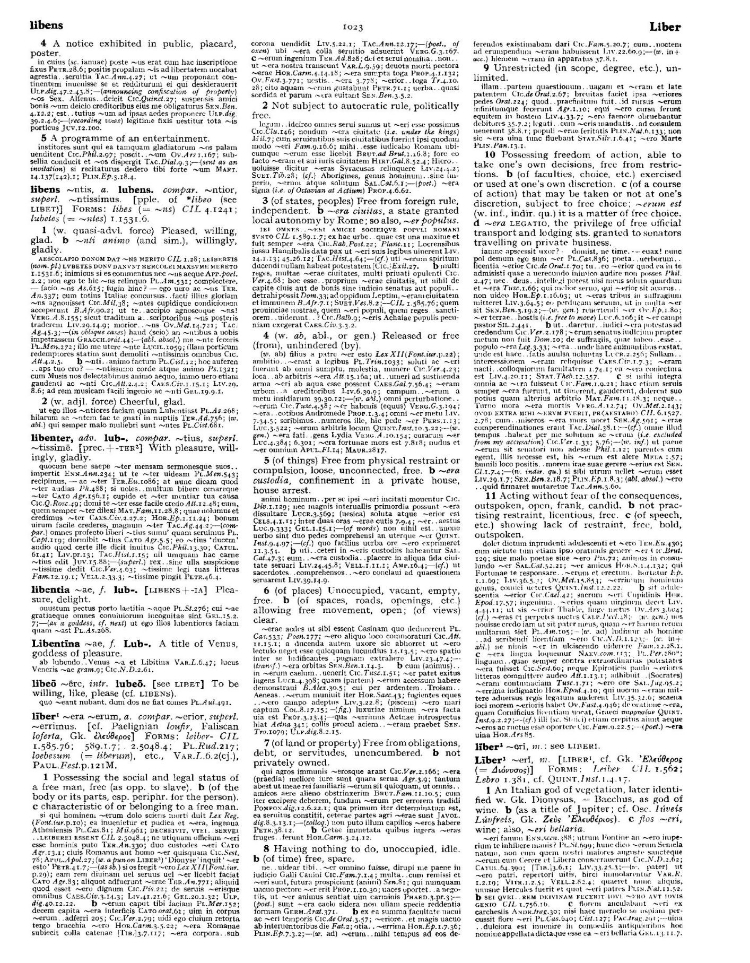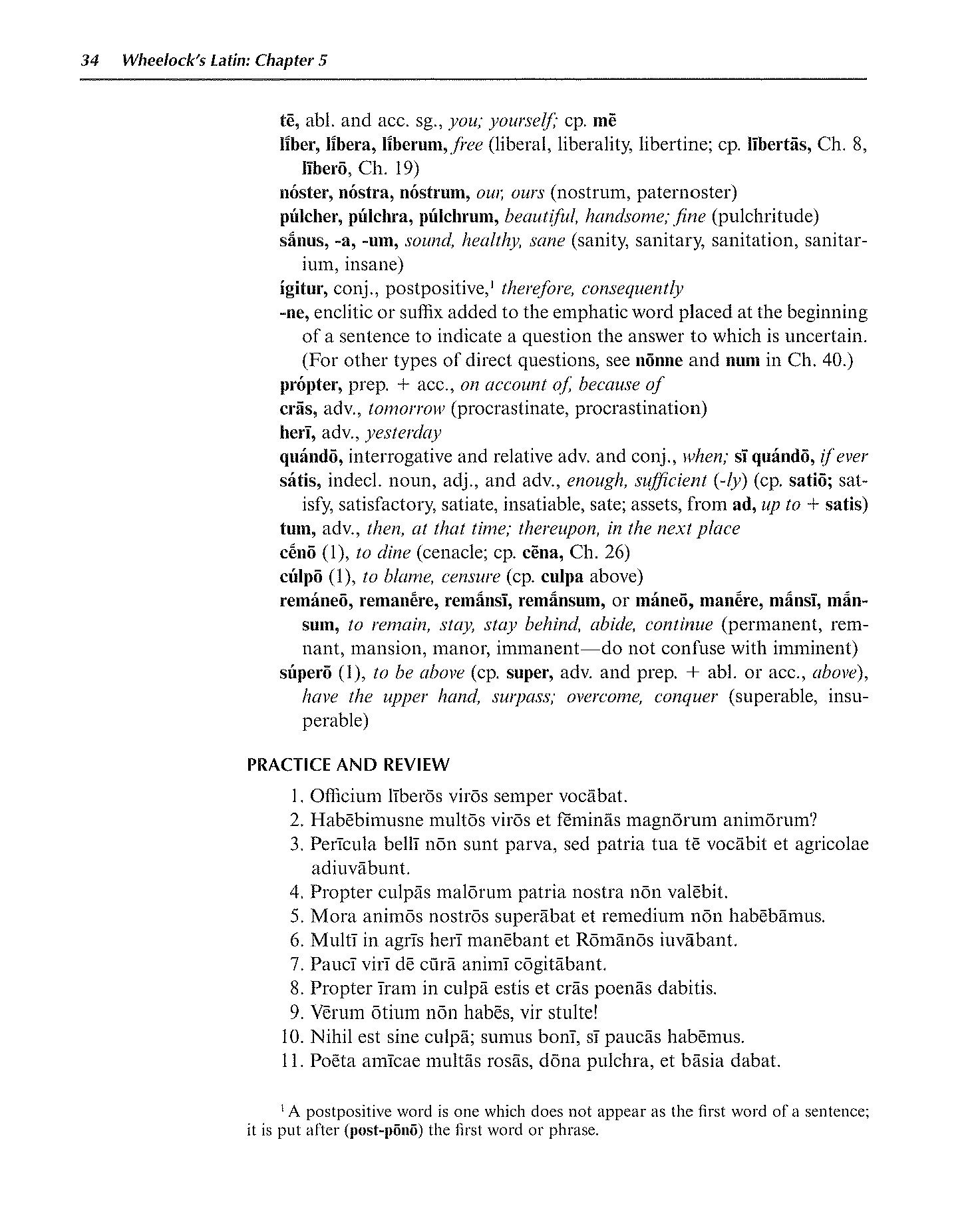
page_listing.tpl
page_subListingDetails.tpl
sub_listingDetails_style1.tpl
sub_listingDetails.title.tpl
līber free
līber is a Latin Adjective that primarily means free.
Definitions for līber
Wheelock's Latin
Adjective
- 1
free
English derivatives:
liberal liberality libertine
Oxford Latin Dictionary
Adjective
- 1
Possessing the social and legal status of a free man, free (as opp. to slave). (b) (of the body or its parts, esp. periphr. for the person). (c) characteristic of or belonging to a free man.
- 2
Not subject to autocratic rule, politically free.
- 3
(of states, peoples) Free from foreign rule, independent. (b) a state granted local autonomy granted by Rome.
- 4
(w. ab, abl., or gen.) Released or free (from), unhindered (by).
- 5
(of things) Free from physical restraint or compulsion, loose, unconnected, free. (b) ~era custodia, confinement in a private house, house arrest.
Sentences with līber
Latin to English
Pulchra patria nostra est lībera.Compare Our beautiful country is free.
Tē, Ō patria lībera, semper amābāmus et sempter amābimus.Compare Free fatherland, we always used to love you and we always shall love (you).
Libera fortunae mors est; capit omnia tellus, quae genuit; caelo tegitur, qui non habet urnam.Compare Death is free from fortune's sway; the earth takes back all she gave birth to; the sky covers the man who had no burial urn.
Quisnam igitur liber? Sapiens, sibi qui imperiosus, quem neque pauperies neque mors neque vincula terrent, responsare cupidinibus, contemnere honores fortis, et in se ipso totus, teres atque rotundusCompare Who then is free? The wise man alone, who is a stern master to himself, whom neither poverty nor death nor bonds affright, who has the courage to say "no" again and again to desires, to despise the object of ambition, who is a whole in himself, smoothed and rounded.
Nunc liber tu inviolatusque hinc dimitto.Compare Now I dismiss you hence free and unhurt.
Data sources
Notes
- Definitions
- Frederick M. Wheelock, Wheelock's Latin, 6th ed., rev. Richard A. LaFleur (New York, NY: HarperCollins Publishers, 2005): 34.
- P. G. W. Glare, Oxford Latin Dictionary, Vols. 1-8 (Oxford: Clarendon Press, 1982): 1023.
- Word frequencies
- Christopher Francese, "Latin Core Vocabulary," Dickinson College Commentaries, last modified 2014, http://dcc.dickinson.edu.
- Paul B. Diederich, The Frequency of Latin Words and Their Endings, PhD diss., (Columbia University, 1939).
- Louis Delatte, Suzanne Govaerts, Joseph Denooz, and Etienne Evrard, Dictionnaire fréquentiel et index inverse de la langue latine [Frequency Dictionary and Inverse Index of the Latin Language] (Liège, Belgium: Laboratoire d'analyse statistique des langues anciennes de l'Université de Liège [L.A.S.L.A.], 1981): 123.
Bibliography
Allen, Joseph H. Allen and Greenough's New Latin Grammar for Schools and Colleges: Founded on Comparative Grammar. Edited by James B. Greenough, George L. Kittredge, Albert A. Howard, and Benjamin L. D'Ooge. Boston, MA: Ginn & Company, 1903.
Crystal, David. A Dictionary of Linguistics and Phonetics. 6th ed. Oxford, UK: Blackwell Publishing, 2008.
Delatte, Louis, Suzanne Govaerts, Joseph Denooz, and Etienne Evrard. Dictionnaire fréquentiel et index inverse de la langue latine [Frequency Dictionary and Inverse Index of the Latin Language]. Liège, Belgium: Laboratoire d'analyse statistique des langues anciennes de l'Université de Liège (L.A.S.L.A.), 1981.
Diederich, Paul B. The Frequency of Latin Words and Their Endings. PhD diss., Columbia University, 1939.
Francese, Christopher. "Latin Core Vocabulary." Dickinson College Commentaries. Last modified 2014. http://dcc.dickinson.edu/latin-vocabulary-list.
Gildersleeve, Basil L., and Gonzales Lodge. Gildersleeve's Latin Grammar: Third Edition, Revised, and Enlarged. 3rd ed. London, England: Macmillan and Co., 1903.
Glare, Peter G.W. Oxford Latin Dictionary. Vols. 1-8. Oxford, England: Clarendon Press, 1982.
Krüger, Bernd. "Latin Conjugation Tables." Cactus2000. Accessed May 5, 2023. https://latin.cactus2000.de/index.en.php.
Pierson, Nick. "Sound of Text." Accessed October 26, 2019. https://soundoftext.com.
Wheelock, Frederick M. Wheelock's Latin. 6th ed. Revised by Richard A. LaFleur. New York, NY: HarperCollins Publishers, 2005.
Wiktionary Contributors. "Victionarium." Wikimedia Foundation, Inc. Updated March 18, 2019. https://la.wiktionary.org/wiki/Victionarium:Pagina_prima.
Citation
Chicago (17th ed.)
Allo Contributors. "līber, lībera, līberum (adj.) - Latin Word Definition." Allo Latin Dictionary. Last modified . Accessed February 15, 2026. http://ancientlanguages.org/latin/dictionary/liber-libera-liberum.
Entry created on . Last updated on .







